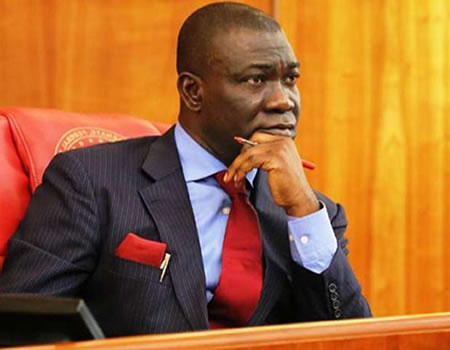
The Deputy President of the Senate, Senator Ike Ekweremadu, on Tuesday, assured that financial autonomy for state houses of assembly and local governments was part of the key issues being considered in the ongoing Constitution amendment exercise.
The lawmaker described financial autonomy as “the single most important constitutional empowerment required by state houses of assembly for effective leadership, in the interest of democracy and development.”
This came at a time the vice chairman of the Conference of Speakers of State Legislatures of Nigeria and Speaker of the Enugu State House of Assembly, Rt. Honourable Uchenna Ubosi, said the Conference of Speakers had resolved to support the autonomy for local governments and state assemblies.
He spoke at the consultative forum for building consensus among stakeholders on local government autonomy organised by the Partnership to Engage and Learn (PERL) in Abuja, on Tuesday.
Ekweremadu, who spoke on the topic: “Providing Effective Leadership for the State Houses of Assembly: Leveraging on the Ongoing Constitution Review Exercise,” he emphasised that the autonomy of local governments was tied to the independence of the state assemblies and understanding of the governors.
He said: “Section 7 of the 1999 Constitution (as amended) empowers the states, through their houses of assembly, to make laws establishing local governments, their structure, composition, finance and functions. Therefore, the independence and efficiency of the leadership of state assemblies are key to the just and efficient exercise of these functions”.
He, however, regretted that undue executive and political party interferences in some states brought debilitating influences to bear on the leadership recruitment process of the legislature.
According to him, “The issue of presiding officers must be settled by the parliamentarians themselves in accordance with Section 92 (1) of the 1999 Constitution (as amended), which provides that ‘There shall be a Speaker and a Deputy Speaker of a House of Assembly who shall be elected by members of the House from among themselves.”
He said imposition of leadership on any state assembly would render it “ineffectual, pliable, and sometimes, a lame duck that is ever willing to do the master’s biddings.”
The lawmaker, who spoke through his media assistant, Uche Anichukwu, cited the example of the 2010 constitution amendment exercise when the state houses of assembly “refused to approve financial autonomy for themselves even when they voted in support of financial independence for the National Assembly.”
Ekweremadu, who chairs the Senate Committee on the Review of the 1999 Constitution, said “the result is that while the National Assembly is no longer at the mercy of the executive arm for its funding, the state assemblies could be easily arm-twisted by starving them of funds, if they refuse to do the biddings of the executive.”
On local government autonomy, he stated: “We are currently making efforts in the ongoing Constitution review exercise to strengthen governance at the grass roots by amending Section 7 of the Constitution to properly situate the local governments as a third tier of the government.
“We are working to make elaborate provisions for their funding, tenure, election, and to clearly delineate their powers and responsibilities. For instance, we seek to abolish the joint state-local government account, in line with popular demand by Nigerians.”





